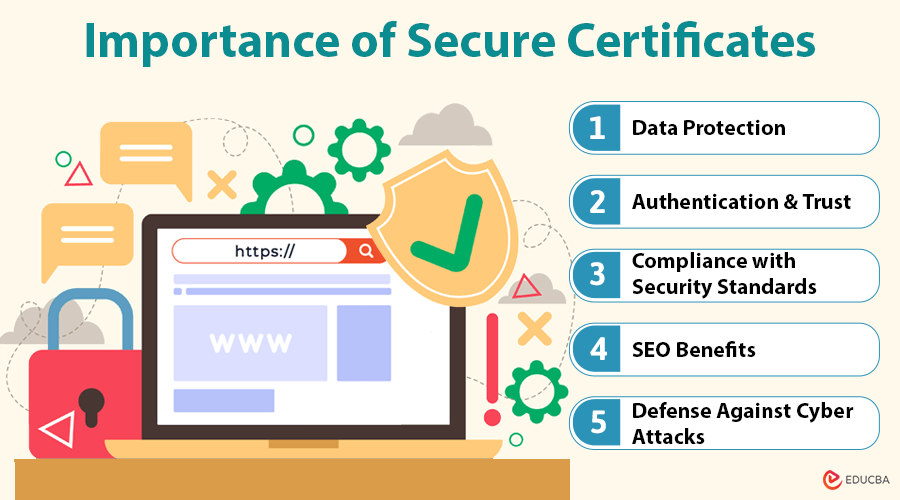
Introduction to Secure Certificates
Security is a primary concern for businesses, individuals, and organizations. Protecting sensitive information has become more critical with the growing prevalence of online transactions, data sharing, and communication. Secure Certificates form the foundation of trust and safety in this digital landscape.
This article will explain Secure Certificates, their function, why they matter, and the available types. Additionally, we will explore how they ensure the integrity and confidentiality of digital communications and transactions.
What Are Secure Certificates?
Secure Certificates, also known as SSL/TLS Certificates, are digital tools that authenticate a website’s identity and encrypt the data exchanged between users and the website. They are vital for secure internet communication, particularly when handling sensitive information such as:
- Credit card details
- Login credentials
- Personal information
These certificates use encryption protocols like SSL (Secure Sockets Layer) and TLS (Transport Layer Security) to establish a secure connection. When a user accesses a website with a valid security certificate, the connection is encrypted, keeping the data safe from unauthorized access or tampering.
How Do Secure Certificates Work?
The process of securing data involves several steps:
1. Certificate Request: The website owner requests a Secure Certificate from a Certificate Authority (CA).
2. Verification: The CA verifies the website owner’s identity by checking domain ownership and other details.
3. Certificate Issuance: Upon successful verification, the CA issues the Secure Certificate, including the website’s public key and relevant details.
4. Secure Connection Establishment: When users visit the website, their browser validates the certificate. An encrypted connection is created between the browser and the server if verified.
5. Encryption & Decryption: The public and private keys associated with the certificate enable secure data encryption and decryption, protecting communication from unauthorized access.
Why Are Secure Certificates Important?
Secure Certificates play a crucial role in modern online security for the following reasons:
1. Data Protection: It protects sensitive information, like personal and financial data, by encrypting it during transmission to prevent hackers from intercepting it.
2. Authentication and Trust: They verify the authenticity of websites, assuring users they are interacting with legitimate entities. Secure websites display a padlock icon and use “https://” in the URL, signaling a secure connection.
3. Compliance with Security Standards: Many industries, including finance and healthcare, require compliance with GDPR and PCI DSS regulations. It helps businesses meet these standards.
4. SEO Benefits: Search engines prefer websites with SSL/TLS certificates, boosting their search rankings and visibility.
5. Defense Against Cyber Attacks: It protects against threats like man-in-the-middle (MITM) attacks by encrypting data exchanges, reducing risks of tampering or eavesdropping.
Types of Secure Certificates
Different types of Secure Certificates cater to varying needs and levels of validation:
1. Domain Validation (DV) Certificates:
- Basic level of validation
- Verifies domain ownership
- Suitable for personal websites or blogs
2. Organization Validation (OV) Certificates:
- Verifies domain ownership and organization legitimacy
- Ideal for businesses seeking to establish trust
3. Extended Validation (EV) Certificates:
- Highest level of validation with rigorous vetting
- Displays the company name in the address bar of the browser
- Commonly used by e-commerce and financial institutions
4. Wildcard Certificates:
- Secures a primary domain and its subdomains (e.g., “*.example.com”)
- Simplifies certificate management for large websites
5. Multi-Domain Certificates (SAN Certificates):
- Secures multiple domains and subdomains with one certificate
- Useful for organizations managing several websites
The Role of Secure Certificates in E-Commerce
E-commerce websites rely heavily on Secure Certificates to protect:
- Payment information
- Personal customer details
- Transaction records
Without Secure Certificates, these sites risk exposing users to data breaches, identity theft, and fraud. Modern internet users know the importance of secure connections and are less likely to trust or transact on insecure websites. For businesses, Secure Certificates are a critical step toward building customer trust and achieving success in the competitive e-commerce market.
How to Get a Secure Certificate for Your Website?
Obtaining a Secure Certificate is straightforward:
1. Choose a Certificate Authority (CA): Trusted options include DigiCert, GlobalSign, Comodo, and Let us Encrypt (a free alternative).
2. Select the Certificate Type: Decide based on your website’s needs (DV, OV, EV, Wildcard, or Multi-Domain).
3. Generate a Certificate Signing Request (CSR): This file contains the domain details necessary to apply for a certificate.
4. Submit the CSR: Provide it to the CA for verification.
5. Install the Certificate: Once issued, install the certificate on your web server.
6. Enable HTTPS: Set up your website to use HTTPS by default to guarantee secure communication.
Final Thoughts
Secure Certificates are the backbone of online security. Encrypting data and authenticating websites protect sensitive information and foster trust in digital transactions. It is important to ensure the safety and reliability of online activities, whether running an e-commerce platform, handling customer data, or browsing the web. By prioritizing Secure Certificates, businesses can safeguard users, enhance search rankings, and comply with industry regulations, creating a secure and trustworthy digital environment.
Recommended Articles
We hope this guide helps you understand the importance of Secure Certificates for your website’s security. Check out these recommended articles for more insights on enhancing your online safety and digital trust.

